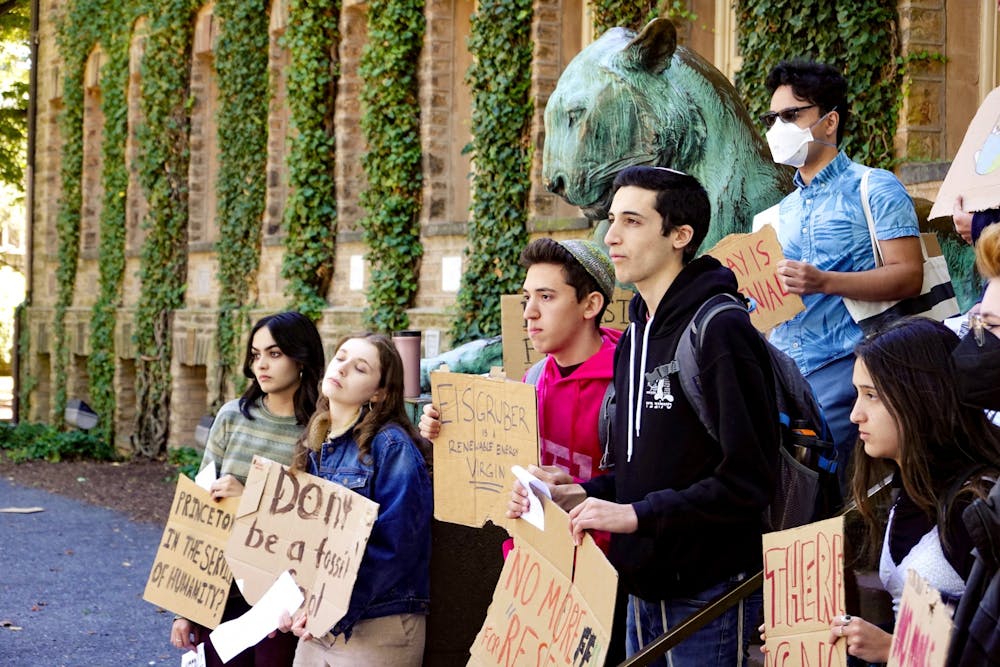On Sept. 29, Princeton University announced that its Board of Trustees voted earlier in the month to dissociate from Exxon Mobil Corp., NRG Energy Inc., and 88 other corporations “active in the thermal coal or tar sands segments of the fossil fuel industry.”
The announcement also stated that the Princeton University Investment Company (PRINCO) will “eliminate all holdings in publicly traded fossil fuel companies” and “ensure that the endowment does not benefit from any future exposure to those companies” as part of the Board’s “commitment to achieving a net-zero endowment portfolio over time.”
Princeton has current or recent financial relationships with 10 of the 90 companies listed as subject to dissociation, including Exxon Mobil, NRG Energy, and Canadian Natural Resources.
According to the announcement, the “quantitative criteria used to determine the dissociation list were based on recommendations made by a panel of faculty experts in a report submitted in May.”
The Faculty Panel on Dissociation Metrics, Principles, and Standards had been created after the Board of Trustees first announced its intention to dissociate from “companies engaged in climate disinformation campaigns or that are involved in the thermal coal and tar sands segments of the fossil fuel industry” in May 2021, following recommendations from the Council of the Princeton University Community (CPUC) Resources Committee.
The thermal coal and tar sands segments of the fossil fuel industry were identified for their exceptionally high carbon dioxide emissions compared to other fossil fuels, according to the announcement.
Dissociation includes divestment — a decision to refuse to invest — from a corporation, but is defined by the University as “also refraining, to the greatest extent possible, from from any relationships that involve a financial component with a particular company,” including “soliciting or accepting gifts or grants from a company, purchasing the company's products, or forming partnerships with the company that depend upon the exchange of money.”
This includes research partnerships with a financial component, such as Princeton’s Andlinger Center for Energy and the Environment, which has had an ongoing research partnership with Exxon Mobil since 2015.
To compensate for the research funding lost as a result of dissociation, the University will “establish a new fund to support energy research at Princeton.”
In the announcement, University President Christopher Eisgruber ’83 was quoted praising this new fund, saying, “Princeton will have the most significant impact on the climate crisis through the scholarship we generate and the people we educate.”
In the May 2022 issue of the Princeton Alumni Weekly, the University released figures related to its holdings in the fossil fuel industry, revealing a $1.7 billion exposure to the industry with $13 million directly invested in fossil-fuel corporations. In the 2021 fiscal year, Princeton’s endowment was valued at $37.7 billion.
The announcement also points out that the University could reform relationships with companies subject to dissociation in the future if it deems that they have “sufficiently changed their practices such that they no longer meet the criteria” for dissociation.

Currently, the University is contacting the leaders of the companies on the list, and if “a company provides information in a timely manner that resolves the concerns or demonstrates changed behavior moving forward, it could be exempt from dissociation and removed from the list.”
Students have been advocating for fossil fuel divestment for almost a decade. Most recently, campus activist group Divest Princeton held a rally on Sept. 23 where students expressed concern about the slow pace of University action, as well as its acceptance of research funding from fossil fuel companies.
Divest Princeton student coordinators Nate Howard ’25 and Aaron Serianni ’25 wrote in a joint statement to The Daily Princetonian that “[t]his decision is the result of a decade of activism by Princeton students, faculty, staff, and alumni.”
They said, however, that “Princeton still falls short.”
Howard is a contributing columnist for the ‘Prince.’
“Divest Princeton will keep fighting for our goals of full divestment and the end to all fossil fuel funding of research on campus,” the two student coordinators wrote. “We know that it’s possible: They’ve come this far. It’s Princeton’s moment to become a leader.”
This article is breaking and will be updated as more information becomes available.
Paige Cromley is a junior who writes for the News, Features, and Prospect sections of the ‘Prince.’ She can be reached at pcromley@princeton.edu.








